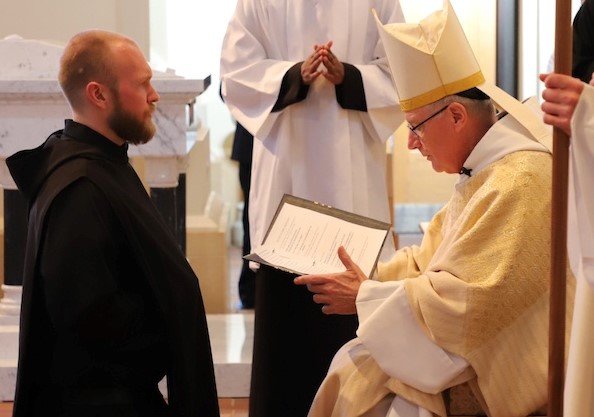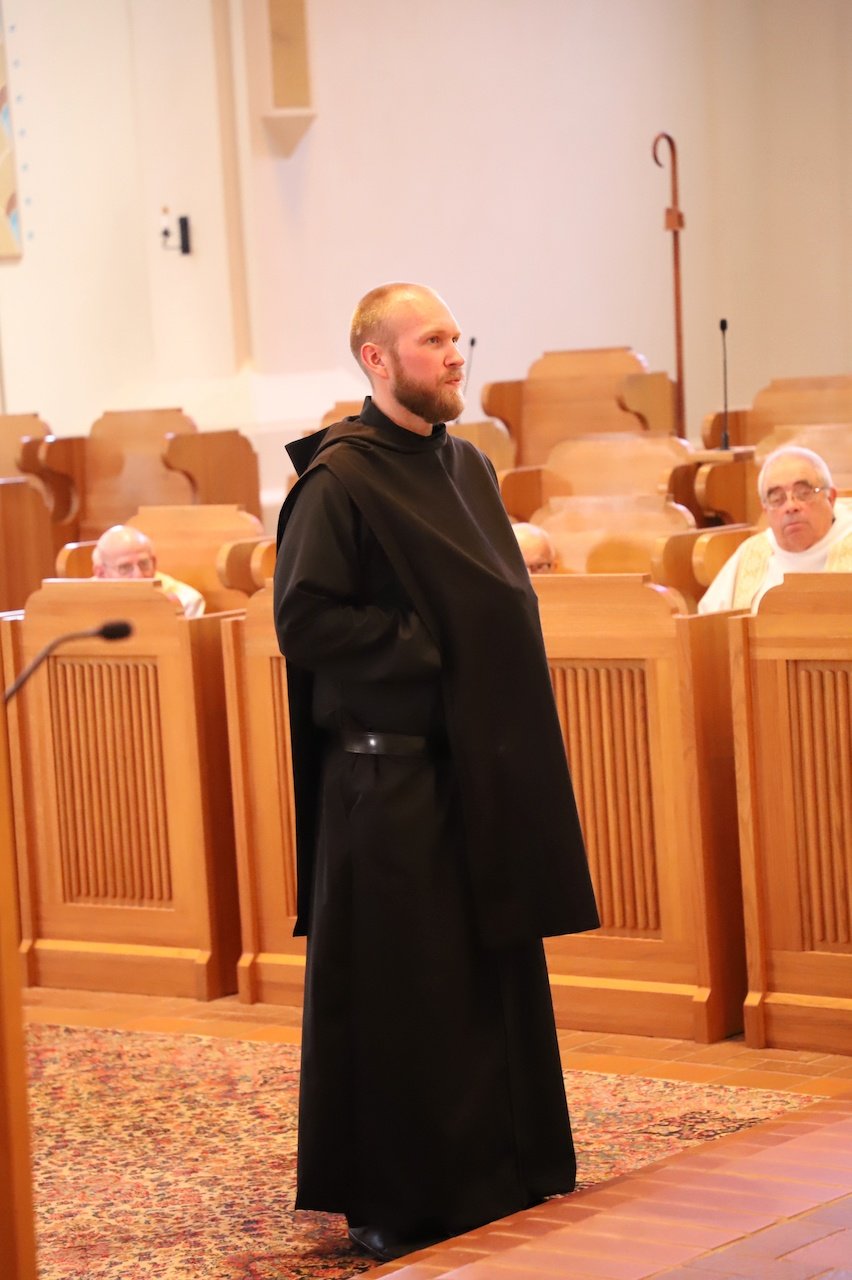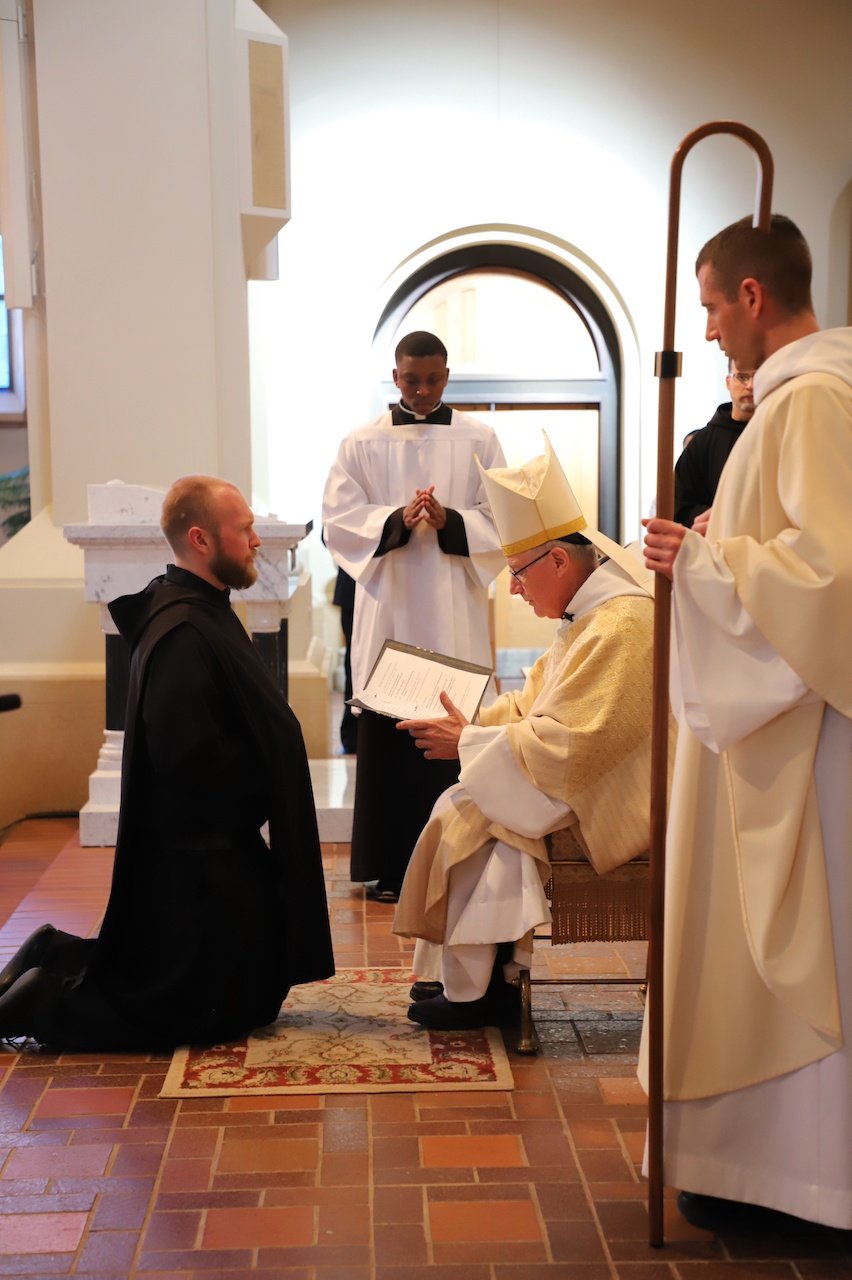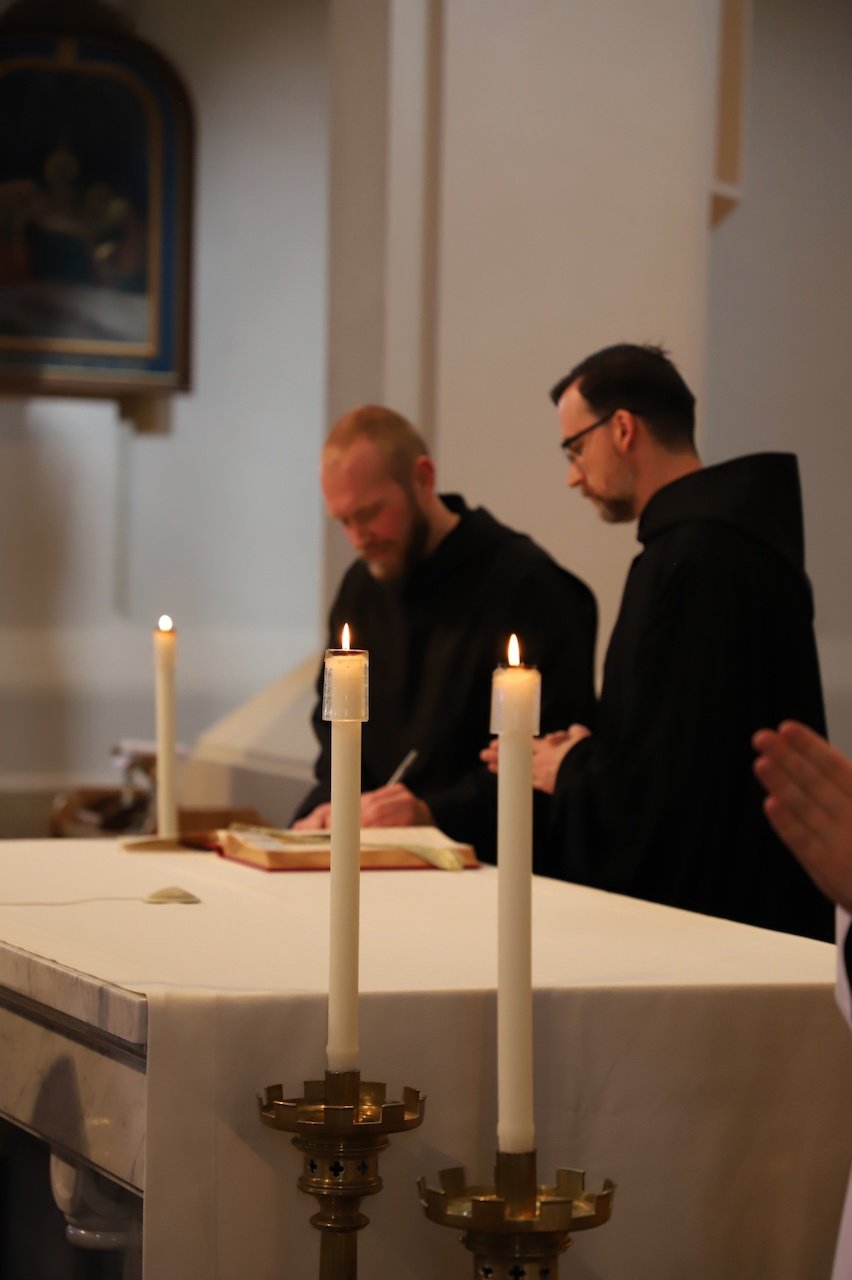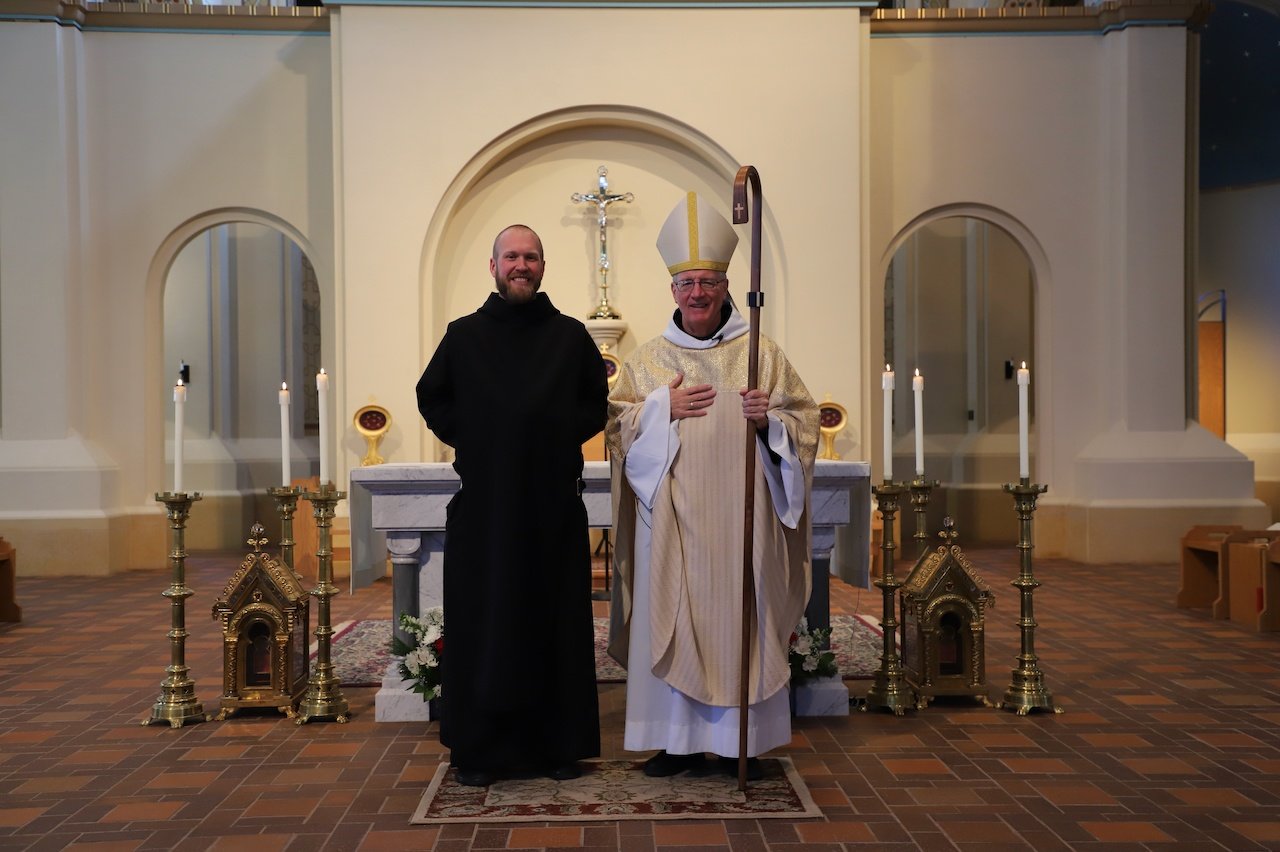Shelby County native professes Benedictine vows at Conception

SCROLL THE ARROWS to see more photos.
Benedictine Brother Gabriel Chinn chose a name that reminds him of the Blessed Mother’s “fiat,” and of his own.
Baptized Daniel, the Shelby County native took one of God’s messenger angels as his namesake upon professing simple vows in the Benedictine Order.
“I want to imitate the posture of the Blessed Mother in the moment of the Annunciation — when the Archangel Gabriel asked her to bear the Son of God,” said Brother Gabriel, who processed simple vows in the Benedictine order on Feb. 3 at Conception Abbey in northwestern Missouri.
“She had no idea what that would mean for her — the absolute challenge of faith, to eventually follow her Son to Calvary and see him suffer and die,” the monk continued.
“But in that docility, she said ‘yes,’” he stated. “That’s what I want to do, as well.”
Benedictines are monks or nuns who take vows of obedience, stability, and conversion of life, which includes the traditional evangelical counsels of poverty and chastity — combining a life of contemplation, apostolic service and intentional community according to the sixth-century Rule of St. Benedict.
They profess vows of poverty, chastity, obedience to God through their abbot, and stability — meaning that they remain in community in one place.
Benedictine monks have been calling Conception Abbey home for 150 years.
Many priests of this diocese received part of their seminary formation at Conception Seminary College, founded and led by the monks of Conception.
That’s how Brother Gabriel arrived in their company.
Early interest
Brother Gabriel was one of three children born to Jim and Diane Chinn.
He grew up on a farm south of Clarence and received his Sacraments in St. Patrick Church and in neighboring St. Mary Church in Shelbina.
“It was just a wonderful community to grow up in,” he said. “You knew everyone, you had a lot of friends.”
His father became Catholic through the Rite of Christian Initiation of Adults when Brother Gabriel was in middle school.
“That was a wonderful journey that I was old enough to participate in and watch,” the son recalled.
Members of young Daniel’s family encouraged him to pursue his childhood interest in God and spirituality. Among them were his grandmother, Carlene Waack, whom he remembers as “a great woman of prayer.”
He spoke openly about wanting to grow up to be a priest.
“I had what I’d call a fascination with the Church itself and ‘what is its relationship to Jesus, and what is the meaning of all this?’” he recalled.
His interest branched out into the Gospels and the Psalms. Fellow parishioners began encouraging him and praying for him to find his way to the Priesthood.
Among them was Father Christopher Cordes, who served as pastor of the Shelbina and Clarence parishes from 1999-2002.
“They encouraged me to consider going to seminary,” said Brother Gabriel. “So I said, ‘Yes, I’ll go to the seminary and give this some real thought.’”
He entered Conception Seminary College as a seminarian of the Jefferson City diocese.
“Being here was really my first exposure to monastic life,” he recalled. “I came here and saw firsthand a group of men living together in community, praying together, working together, all for the glory of God.”
He felt drawn to that life.
“It spoke to my heart,” he said.
Not quite ready
The future monk talked to Bishop John R. Gaydos, now retired, of Jefferson City; Father Joseph Corel, who was diocesan vocation director; and Father David Veit, who was director of seminarians, about his desire to explore monastic life.
“They were very supportive,” he recalled.
Father Daniel Merz, a priest of the diocese, was serving at Conception Seminary College as vice rector and dean of students.
“He was supportive and very challenging,” Brother Gabriel recalled. “He challenged me to grow quite a bit, and I appreciated that very much.”
Brother Gabriel looked into other monastic communities but decided to enter formal discernment with the Benedictines at Conception.
“I found a community here that fit,” he said. “It seemed like it was home.”
But after two years in the seminary and almost a year in the novitiate at Conception, he still wasn’t sure.
“Basically, I was afraid to make a commitment,” he said. “There were other avenues I wanted to pursue.”
He left the novitiate, went back to school, finished his teaching degree and taught English for two and a half years near Kansas City.
A friend, Benedictine Father Paul Sheller, invited him to return to Conception for a co-ed retreat for young adults.
A few days later, the monastery’s director of development encouraged him to apply for an opening in her office. He accepted.
“I found it very helpful to see monastic life in a new way while I was not actively discerning,” he said. “I was here, believing in the work we do for seminary formation and providing a space for people to encounter God through the witness of our monastic life.
“I was blessed to speak to our many supporters and develop relationships with them,” he said.
During the COVID-19 pandemic, he and a group of friends in nearby Maryville started gathering to ask big questions about their lives and what God really wanted from each of them.
He talked to Abbot Benedict Neenan, leader of the Benedictines at Conception, who finally encouraged him to come back and “really do the work of discernment” — praying and listening for God’s direction.
“It became clear that I needed to discern monastic life within the monastery,” said Brother Gabriel. “I needed to give myself over to this vocation once again and find out for sure.”
Back in the novitiate, removed from many of the pressures and distractions of society and the world, he came to understand what God was asking of him.
“We don’t run away from the world to come to the monastery,” he noted. “We just carry the world with us in a different way.”
For years to come
One of the keys to Benedictine monastic life is the vow of stability.
“That means I’m going to commit myself to live at this monastery — with these people, in this place — in service to God for the rest of my life,” said Brother Gabriel.
“This is where I’m going to serve God in whatever way I’m being called,” he said. “These are the people that I’m going to pray next to, that I’m going to work next to, quite possibly for the next 50 or 60 years.”
Living in intentional community with people of sometimes radically different backgrounds and perspectives can be difficult.
“But when this is your vocation, the people here will help you bear your burdens and enter into a deeper relationship with God, and you will spend your life doing the same for them,” he said.
That mutuality helps the monks accomplish great things That mutuality helps the monks accomplish great things for God and his Church.
“Our work of prayer and common life allows us to provide the care and attention to the seminarians we’re forming in the seminary in a unique way that only we can do, and provide a restful retreat for the people who come here as guests that allows them to know that they are in the presence of God,” said Bother Gabriel.
“Right now”
By professing simple vows, Brother Gabriel stated publicly before God that he accepts this as his lifelong calling from God.
“And that is to be my gift to the Lord right now,” he said.
This time in simple vows is a period of discernment of whether or not to make the vows perpetual.
Brother Gabriel talked about how everyone who is baptized has received a calling to follow Christ and live and grow in the holiness that comes from God.
Each person also receives a particular calling, a path and mission through this life, willed by God as part of his plan to offer salvation to all people.
“It goes back to what Jesus said is the greatest commandment: love God with your whole being, and love your neighbor as yourself,” said Brother Gabriel.
“And also his command at the Last Supper to ‘love one another as I have loved you,’” he continued. “For me, that’s what I’m trying to live out, and that’s what all vocations are trying to live out in different ways. And this is how I am now convinced that I am being called to do that.”
He will remember and re-profess those vows again and again, each time someone addresses him by name.
“That reminder of the Annunciation will prompt me to say, ‘Yes, today, I am going to live out this calling and to rely on God to help me,’” he said.
It will also remind him of all the people who have encouraged and challenged him to say “yes” to God and his vocation.
“And I will give thanks for them and keep praying for them,” he stated.
He said he’s excited to find out what God has in store for him — whether it be teaching or leading retreats or ministering at neighboring parishes or serving in some other capacity at the monastery — and whether he is being called to be ordained a priest or to remain a brother.
He won’t lose sight of his friends and loved ones back home.
“Part of my vocation of prayer is to remember where I’ve come from,” he stated.
“So I ask the people of my home diocese to pray, as I do, for vocations to serve both in the Diocese of Jefferson City and here at Conception and throughout the Church, and that people will find their vocation and have the courage to follow it in today’s culture,” he said.
Comments
Other items that may interest you
Services
The Catholic
Missourian
2207 W. Main St.
Jefferson City MO 65109-0914
(573) 635-9127
editor@diojeffcity.org

